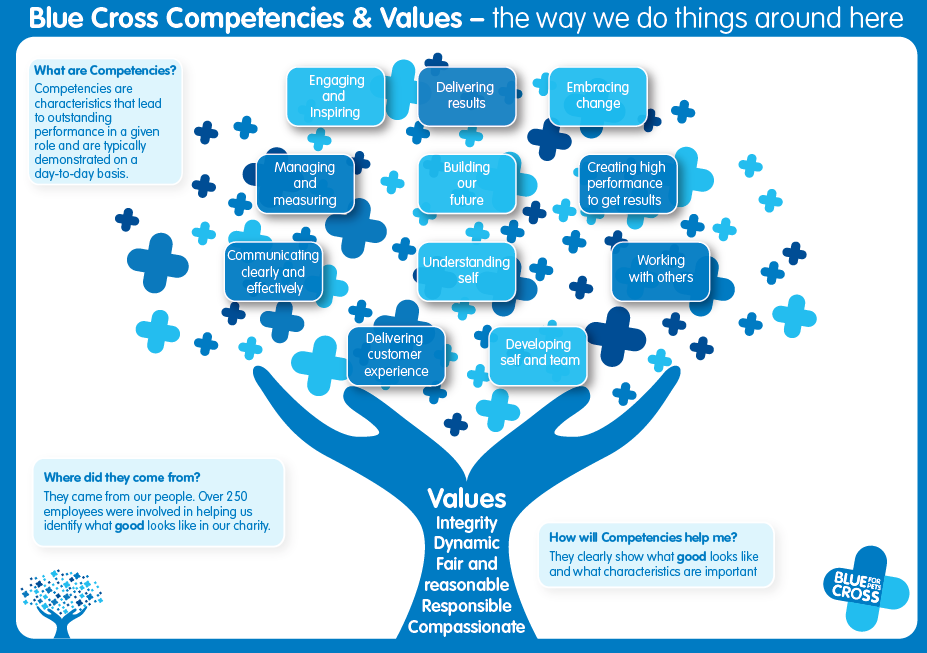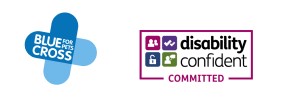 Recruitment home
Recruitment home

Our values
‘The way we do things around here’
Our values and behaviours, (or competencies if you want to be fancy) are incredibly important to us not only because our people came up with them, but because we truly live and breathe these.
As pretty as they are, we don’t just put them on the wall and forget about them, we use these every day to guide us and ensure that we put people and pets at the heart of everything we do.
Sound interesting? Let us tell you more ….
We are guessing that you may be looking at this website as you might be interested in working or volunteering with us? Well if you are, then you should probably know that we use these in our recruitment process too.
We really want to make sure that you understand who we are, what we hold dear and how our Blue Cross family work together, so we structure interview questions around these. Of course there are other more job specific questions too but we wouldn’t want to give it all away!
In addition, we also use them to measure performance and in designing our learning and development content. So they are kind of important.
We want to see you shine!
We use competency-based interviews at Blue Cross to help us find the best people to join our amazing teams to help more pets in need.
Our competency-based interviews (you may also know theses as structured, behavioural or situational interviews) are designed to assess one or more skills or competencies. We ask candidates a number of set questions, relevant to the role they have applied for, each focusing on a specific skill. Once the interview has finished, we compare the candidate’s answers against pre-determined criteria and they are marked accordingly.
We use this approach because we believe that past behaviour is a good indicator of future performance – helping us to determine whether a candidate has the skills and experiences needed to excel in the job. They also enable us to design a job application process as objective as possible, removing any conscious or subconscious bias by the interviewer by asking each candidate the same questions.
The interview questions for a role at Blue Cross are driven by the skills and behaviour that’s required for that particular job. You will find it useful to review the job description for the role that you are applying for, as the skills and behaviours that we are looking for will be detailed in it.
Examples of competency-based interview questions include:
“Tell me about an occasion when you had to complete a task under a tight deadline”
“Describe a project where you had to use different leadership styles to reach your goal”
“Tell me about a time when your communication skills improved a situation”
“Give me an example of a challenge you faced in the workplace and tell me how you overcame it”
To help you prepare for your interview and structure your answer to competency-based interview questions, you may find it beneficial to familiarise yourself and use the STAR interview response technique.
Using the STAR method of answering interview questions allows you to provide tangible examples or proof that you possess the experience and skills needed for the job you’ve applied for.
STAR is an acronym for four key concepts.
STAR stands for:
Situation
Task
Action
Result
By using all four steps in your answer to a competency-based interview question, you can provide a provides a comprehensive answer.
Situation
Describe the event or situation that you were in. Describe the context within which you performed a job or faced a challenge at work. For example, perhaps you were working on a group project, or you had a conflict with a colleague. This situation can be drawn from a work experience, a volunteer position, or any other relevant event. Be as specific as possible.
Task
Next, describe your responsibility in that situation by explaining the task that you had to complete. Perhaps you had to help your group complete a project within a tight deadline, resolve a conflict with a colleague, or hit a performance target.
Action
You then describe how you completed the task or tried to meet the challenge by explaining the specific actions you took to complete the task. Focus on what you did, rather than what your team, manager, or colleague did. Tip: Instead of saying, "We did xyx," say "I did xyz."
Result
Finally, explain the outcomes or results achieved by the action you took. It may be helpful to emphasise what you accomplished, or what you learned.
How to prepare for an interview using STAR
Since you won’t know in advance what interviewing techniques your interviewer will be using, you’ll benefit from preparing several scenarios from the jobs you’ve held.
First, make a list of the skills and/or experiences that are required for the job. It will help you to look at the job advert and job description for indications of the essential and desirable skills/qualities and match your skills, knowledge and experience to those detailed. Then, consider specific examples of occasions when you displayed those skills. For each example, name the situation, task, action, and result.
Whatever examples you select, make sure they are as closely related to the job you’re interviewing for as possible.
